360 Total Security Antivirus review
This review is dedicated to the free 360 Total Security antivirus. The purpose of this article is to show its functionality and demonstrate how it behaves in real conditions. But first, let's look at what he can do.
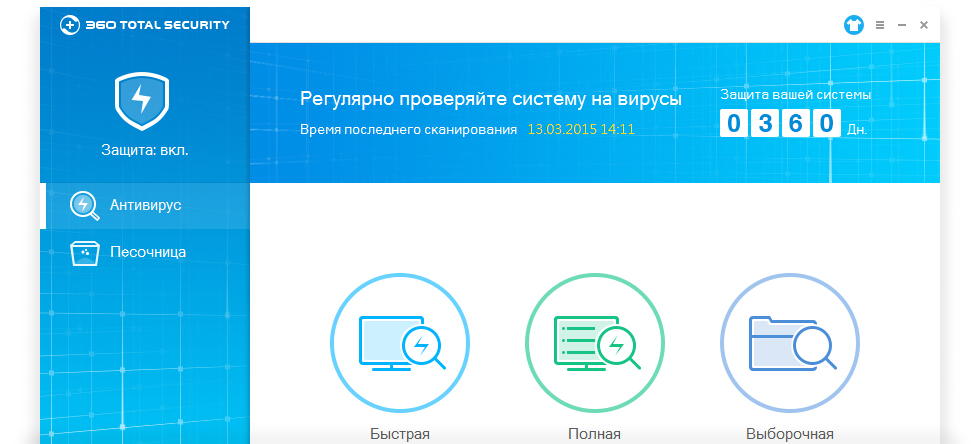
Our site presents two software products - 360 Total Security and 360 Total Security Essential. The difference between them lies in the set of auxiliary modules. So, 360 Total Security Essential lacks an optimization module, temporary files cleaning, Wi-Fi security checks, and a Patch Up module.
The remaining functions of these antiviruses are the same, namely, the composition of both software products includes several anti-virus engines - 360 Cloud Scanner (360 Cloud), Avira AntiVir, Bitdefender AntiVir, 360 QVMII AI, sandbox, safe shopping module, anti-malware module (malware), webcam protection and keyloggers protection, system protection module. The last module includes checking USB storage devices during connection, firewall, behavioral blocking, registry protection, file scanning during opening and saving, and some other types of runtime protection.
')
Let's see what 360 Total Security looks like against competitors. Since the product is free, competitors will also be free. However, there are a lot of antiviruses, and it would be difficult to compare the product under consideration with all existing antiviruses, so Avira Free Antivirus and Avast Free Antivirus were chosen as competitors for 360 Total Security.
The choice of competitors is due to several factors. Firstly, Avira Free Antivirus is considered the best free antivirus in 2015, in any case, it is said on their website, where the corresponding infographics are given. Secondly, 360 Total Security uses the Avira Antivir engine (although, in fact, it is only one of the engines, and only three different anti-virus engines are supported that can work together), so it was interesting to compare 360 Total Security with this antivirus. As for Avast, it showed very good performance (which is important for the antivirus - it should provide a good level of protection, but not consume a lot of system resources), which was shown in one of the reviews in “Hacker”. The table below allows you to evaluate the functions of the compared antiviruses. The table does not display the main functionality (monitor + scanner) - it is clear that any modern antivirus will have it, with the exception of the very trimmed scanner products like Dr. CureIt Web. The main functions also include protection against malware - malware. The fact is that some antivirus vendors allocate protection against malware as a separate function (for example, 360 Total Security), others consider it part of a scanner (Avira and Avast), others don’t even mention it, but this does not mean that antivirus cannot deal with this kind of software.
Comparison of the functionality of some free antiviruses
(*) These functions are implemented as an extension for the Avira Browser Safety browser (Chrome, Firefox, Opera, IE are supported).
(**) This function is not separated, but all modern antiviruses detect keyloggers as malware.
Let's see what happens. The first thing that catches the eye is the fact that modern antiviruses are equipped with functionality that is in no way connected with the antivirus scan and system protection itself. So, Avira has a price comparison feature that allows you to save money when shopping online. 360 Total Security Antivirus is equipped with a powerful set of functions for optimizing and cleaning the system. And Avast has a built-in password manager.
The most "empty" option - Avast Free Antivirus. Only the antivirus itself (scanner and monitor), the browser protection feature and the password manager are included in its “bundle”. Yes, there is the Avast Internet Security product. There is also phishing protection, firewall, spam protection, but only a 30-day version is available for free, and a license for one year will cost 900 rubles for 1 PC or 2350 rubles for 3 years. The same can be said about Avira - if you need additional features, then you need to buy either Antivirus Pro (23.95 euros) or Internet Security Suite (30.95 euros). The most complete version is Internet Security Suite, it combines all the functions of Antivirus Pro plus functions for optimizing the system and encrypting files. Separately, the "additive" will cost 16.95 euros (product System Speedup). Note that 360 Total Security has all these features available for free.
So, 360 Total Security is completely free of charge, offering cloud protection, a firewall, fixing vulnerabilities (patch-up), system optimization and system cleaning, as well as a number of minor pleasant “lotions”.
The installation process is so simple that any housewife can handle it. You need to download and run the installer (which, by the way, takes only 29.4 MB - this is a complete set for standalone installation), then you can either immediately click the Install button , or click the Settings button to select the folder to install the antivirus. No other settings (except for the choice of language) is offered.
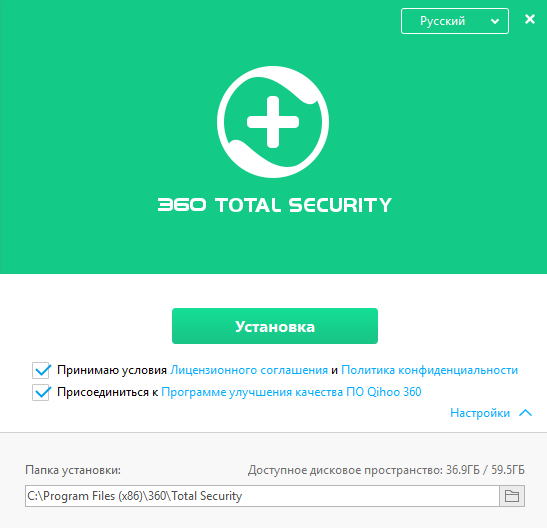
Fig. 1. Installer 360 Total Security
The anti-virus includes several anti-virus engines, as noted earlier:
Individual engines can be turned on and off in the program settings, but first you need to download and install these engines. Fortunately, this process is fully automated. The user only needs to go to the Anti-Virus section and click the button corresponding to the desired engine. Below is the process of downloading and installing the Avira AntiVir engine. You can disable a temporarily unnecessary engine either in the program settings, or using the slider, which appears when you hover the mouse pointer to the engine button.

Fig. 2. Installing the Avira AntiVir engine
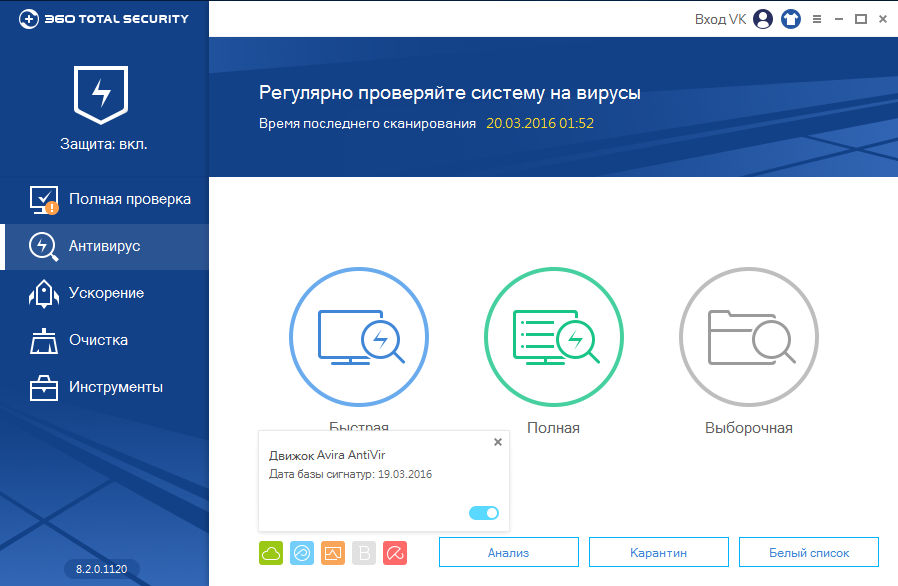
Fig. 3. Slider on / off the anti-virus engine
In practice, it is very convenient. In one "vial" the user receives several antiviruses that can be turned on / off at any convenient time.
In fig. 4 shows the result of a full system scan. The program has found two problems - 4 threats related to the optimization of the system, and many temporary files (1.4 GB). Next, the user can click the Repair button to correct the threats, and then click the Recheck button to re-check. As you can see, the program interface is quite simple and informative.
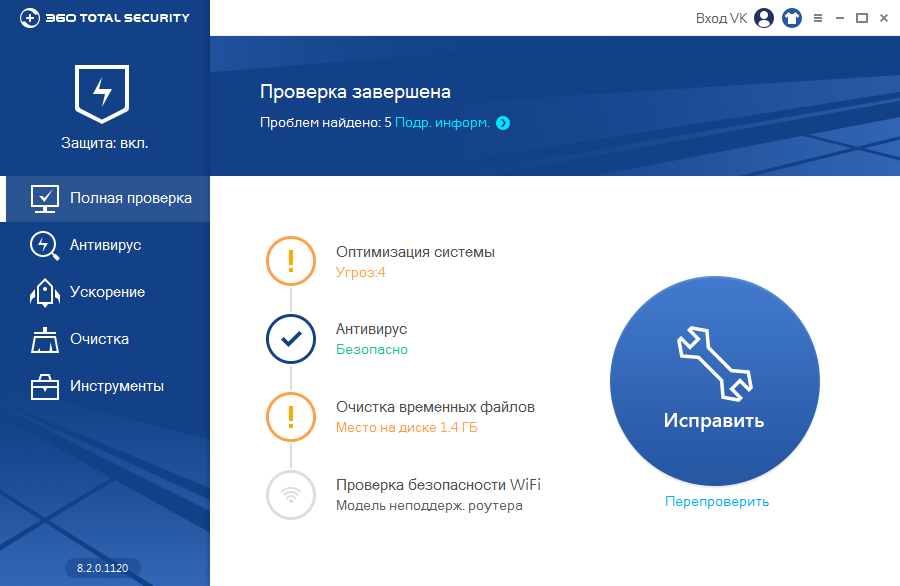
Fig. 4. The result of a complete system check.
Full system scan includes the search for problems related to the optimization of the system, the search for "garbage", as well as the search for viruses and other malicious programs. The Wi-Fi security check module could not be verified, because for some reason the router model I use is not supported by the program.
If desired, you can conduct all these checks separately. For example, in the Anti-Virus section (see fig. 2 and 3), you can perform quick, complete and selective (for example, scan files on a flash drive) system checks. Further in this review anti-virus protection will be shown in action. As they say, "do not switch."
The system optimization module found in test freshly installed Windows 10 as many as 22 points for optimization (Fig. 5). The module offers to disable some scheduled tasks (as a rule, unnecessary ones like software quality improvement programs), some unnecessary services (who needs font font buffering?), As well as optimize the network connection. To fix all the problems found, click the Optimize button.

Fig. 5. Optimization module
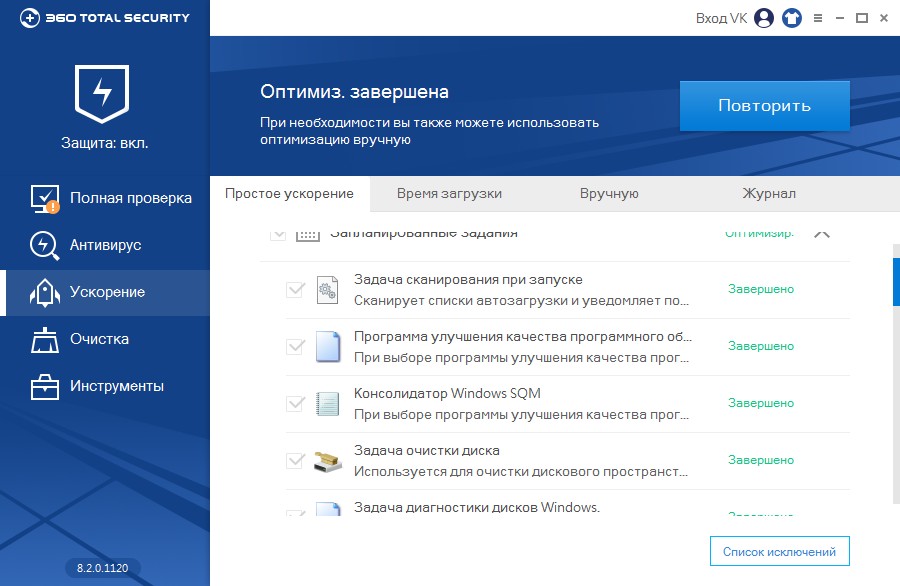
Fig. 6. System optimization done
The system cleaning module allows you to remove various garbage like temporary files, browser cache files, system garbage, etc. (Fig. 7).
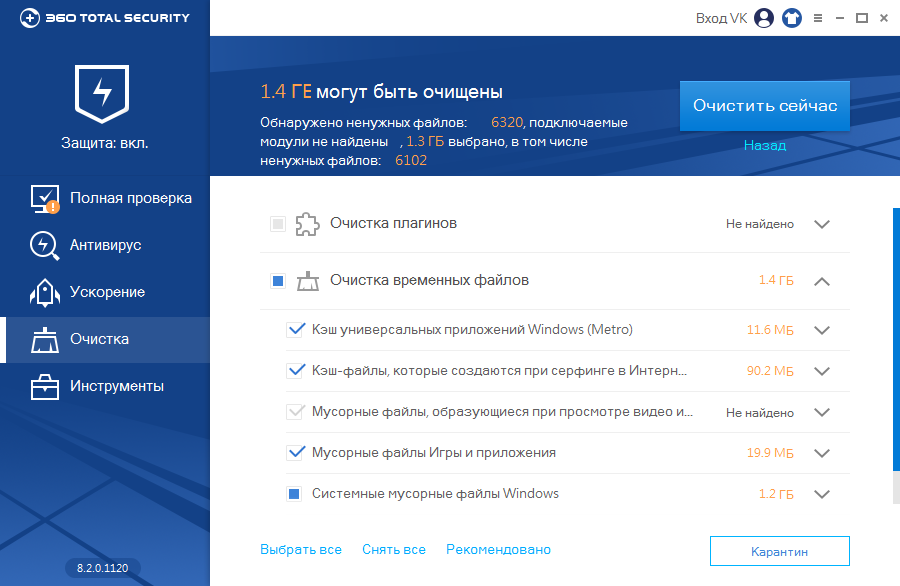
Fig. 7. System cleaning module
When the cleaning is completed, the program will offer to free up additional disk space using the System Backup Cleaner (Fig. 8). If the automatic update of your system is not turned off, this tool can be quite useful, since it allows you to delete unused backup files of system updates, which take up quite a lot of space (Fig. 9).
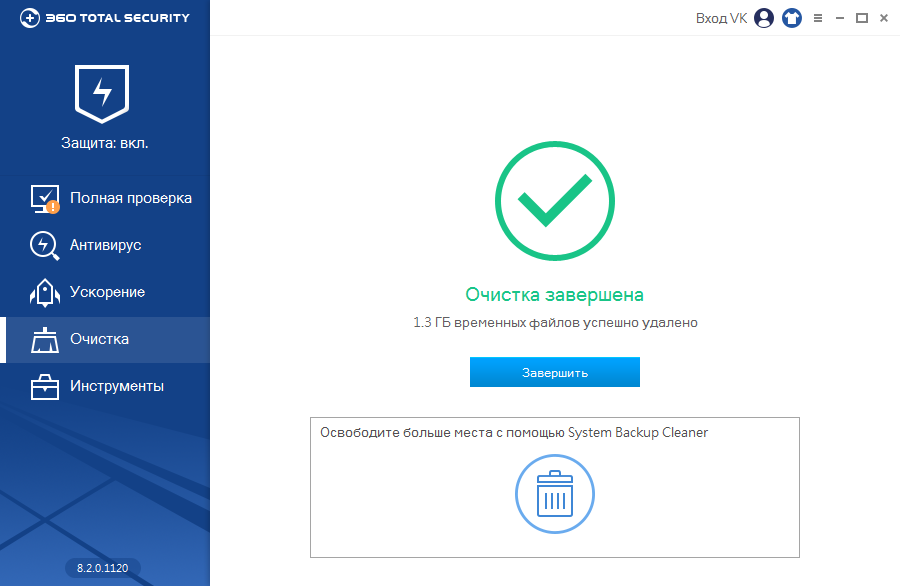
Fig. 8. Cleaning complete
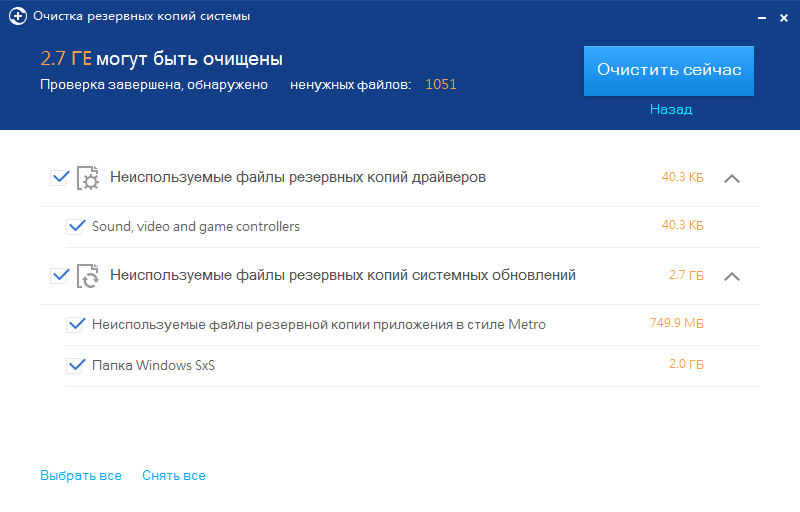
Fig. 9. Cleaning up system backups
The composition of 360 Total Security includes the following additional tools:
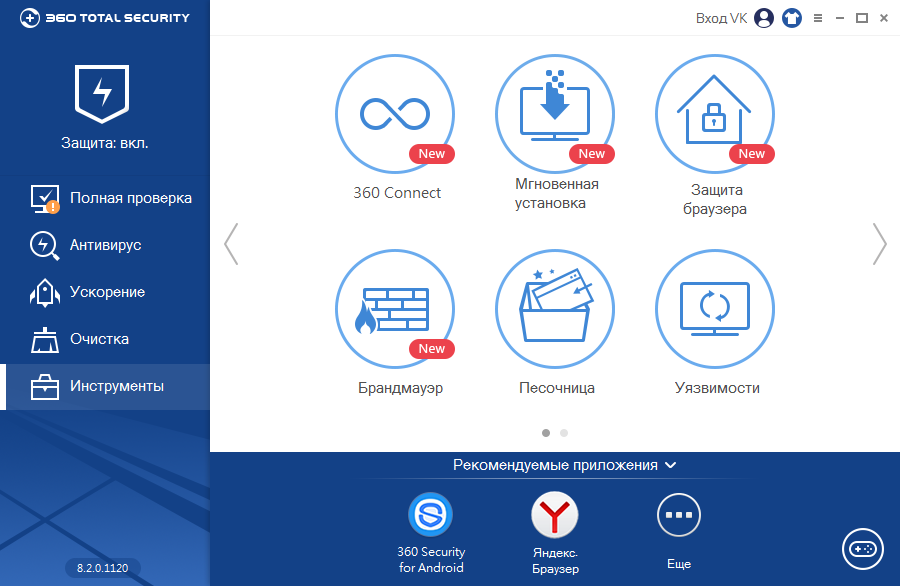
Fig. 10. Additional tools
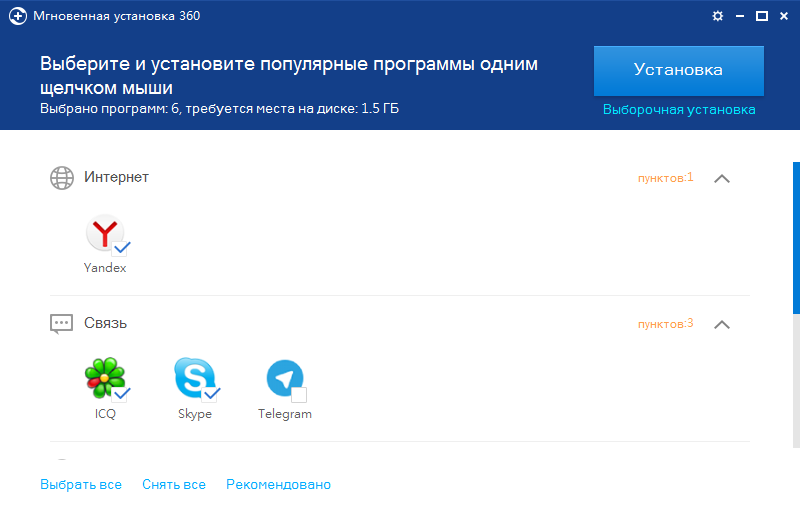
Fig. 11. Instant installation of programs
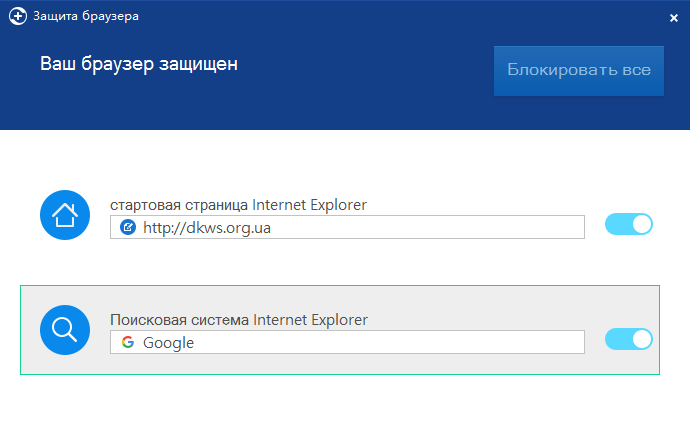
Fig. 12. Browser protection
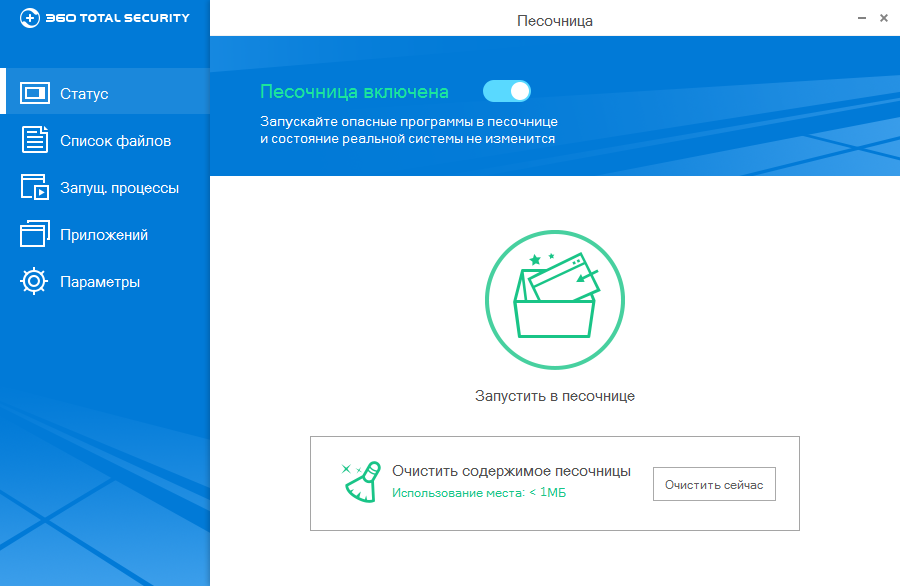
Fig. 13. Sandbox
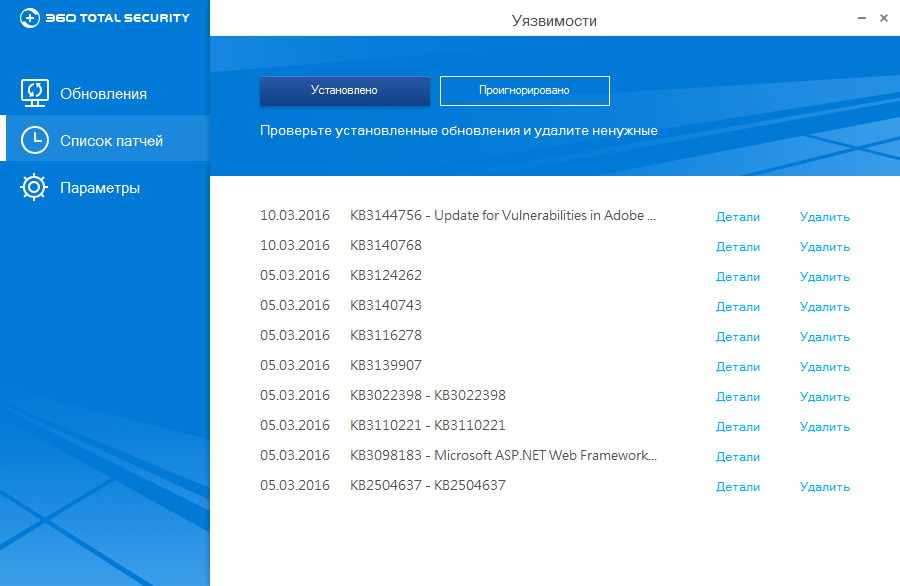
Fig. 14. Security Updates
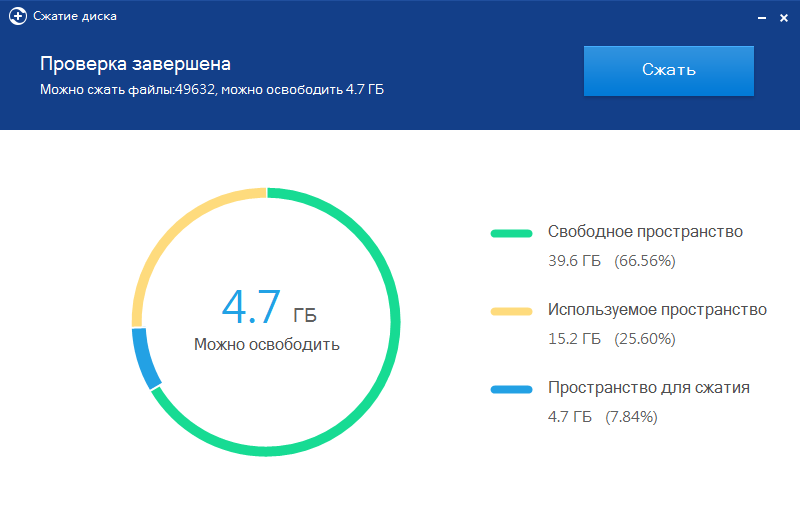
Fig. 15. Compressing system files. You can free 4.7 GB.
Three processes hang in the memory, which very modestly consume both processor time and RAM. Screenshot 16 was made on a test machine, and on a working laptop on which these lines are written, Firefox takes up 530 MB of RAM, so against its background, the total memory consumption of up to 50 MB seems like a drop in the ocean.
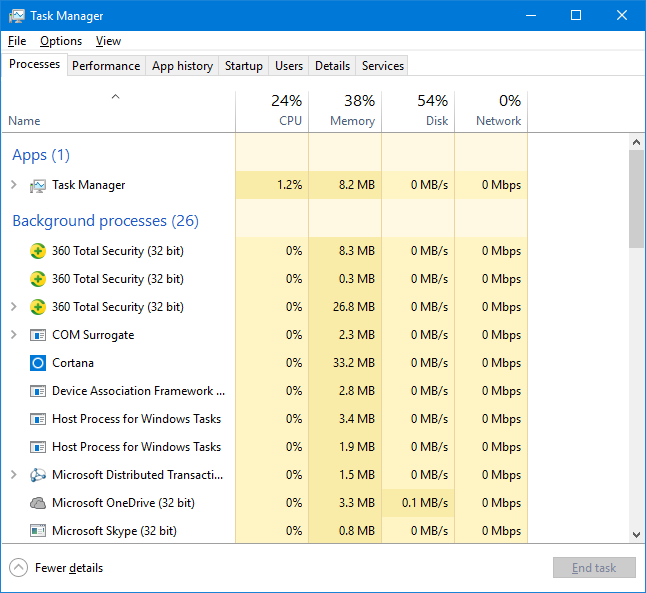
Fig. 16. System resources
The test machine is still pretty weak - 3 GB of RAM and dual-core Intel 1000M mobile about 1.8 GHz. The operating system is 64-bit Windows 10, as it is planned to upgrade the memory to 8 GB. But even in such a configuration, the presence of an antivirus does not affect system performance. Special brakes are not felt, and if they are, they are invisible to the user.
Noticeable braking is possible only when the antivirus is running in scanner mode and a computer scan is running. But it is unlikely that a user suspecting that his PC is infected (and then why start a full scan?) Will calmly continue working at this point - he will wait for the system to check, and for the time of the check itself will close all applications. Even if such a user wants to work, then after starting the scan, you need to wait a bit - the consumption of system resources is significantly reduced (Fig. 18).
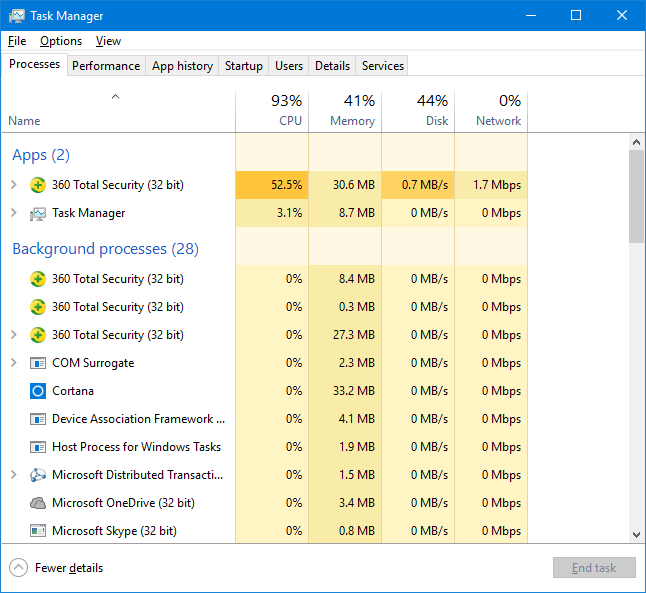
Fig. 17. Consumption of system resources when scanning a PC at the time of launching the scan
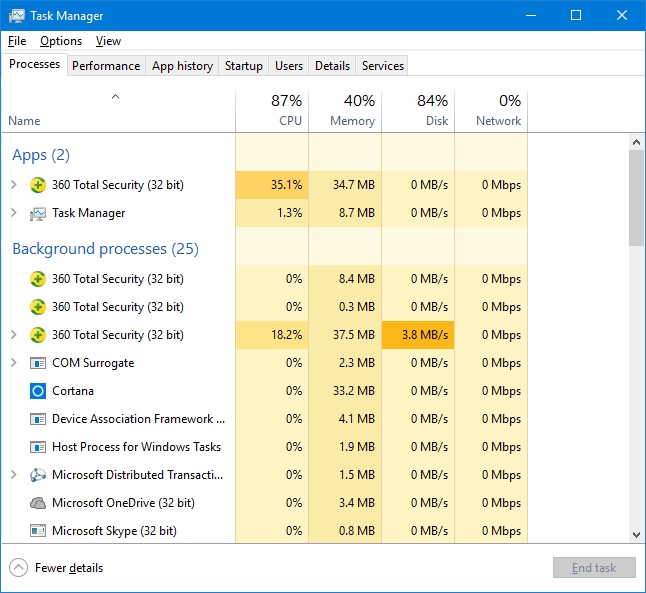
Fig. 18. Verification is in full swing. Only 35.1% of CPU time is used, the hard disk is also not overloaded
In some reviews, the 360 Total Security product is being criticized for a rather resource-demanding anti-virus update mechanism. But on the test machine was not seen anything like that. In fig. 19 shows that the process of updating the antivirus took only 5.5% of the CPU time.
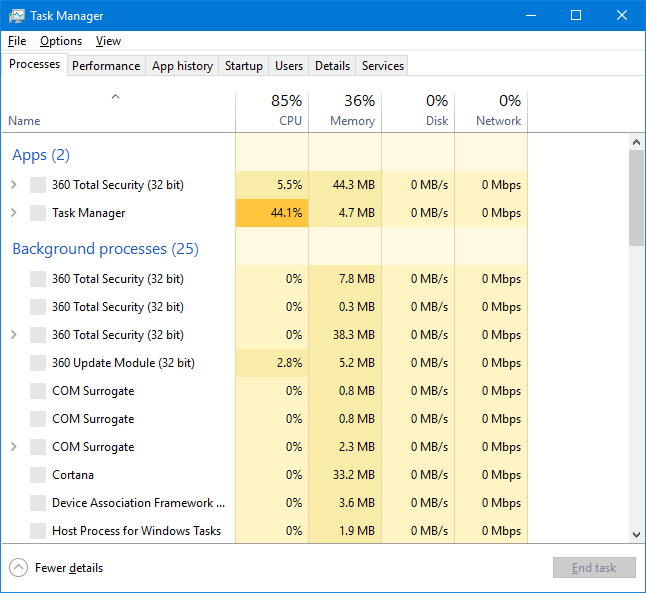
Fig. 19. Antivirus update process
The time has come for the most interesting part of this review - the real test. I have a good selection of infected files (both exe and Word documents). Each file from this collection is infected, there are 142 files in total. Let's see how many viruses 360 Total Security will find. All viruses are detected by other antiviruses like Dr. Web, Kaspersky, etc. For greater fairness, additional engines will be disabled, only standard protections will be used.
In order not to infect the system, everything was checked like this: the archive was copied (with a password), then it was unpacked. Immediately after unpacking, the antivirus began to respond. The result of his work is shown in Fig. 20 - 92 infected files were found and eliminated. Next, the antivirus recommended running a quick scan, since many malicious programs were found at once (Fig. 21).
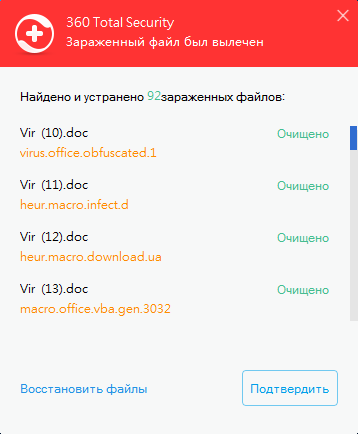
Fig. 20. The results of the anti-virus
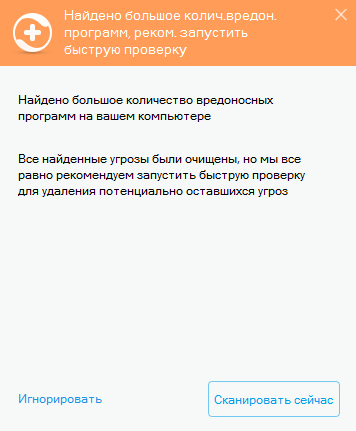
Fig. 21. Run a quick check?
Let's give the antivirus a second chance. Let's try to check the folder into which the infected files were unpacked by the scanner. Antivirus found only one more file (a total of 93 files out of 142 were recognized as dangerous).
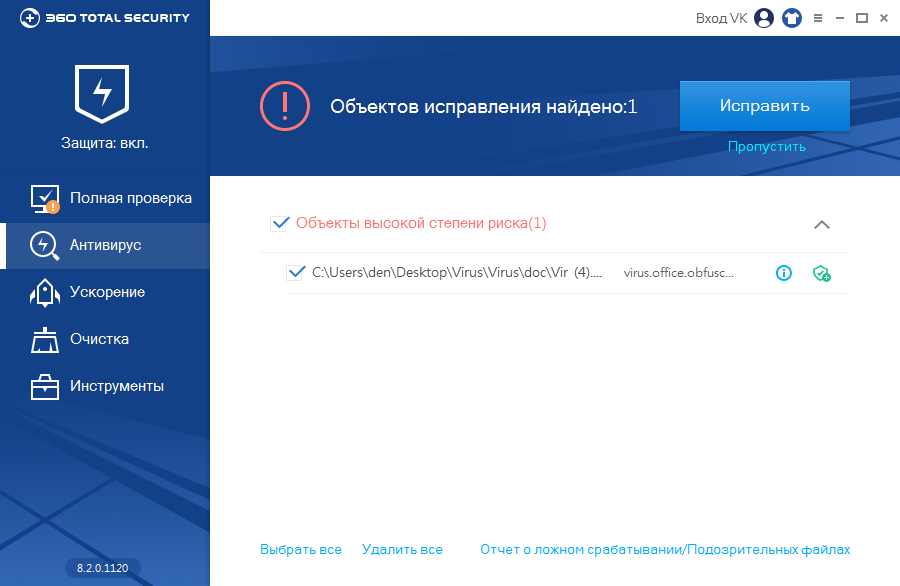
Fig. 22. Found another virus
Now we will turn on both additional engines - Avira and Bitdefender and try again to scan the folder with the viruses. Logically, there are still 49 infected files in it. Voila Antivirus found the remaining 49 viruses (Fig. 23).
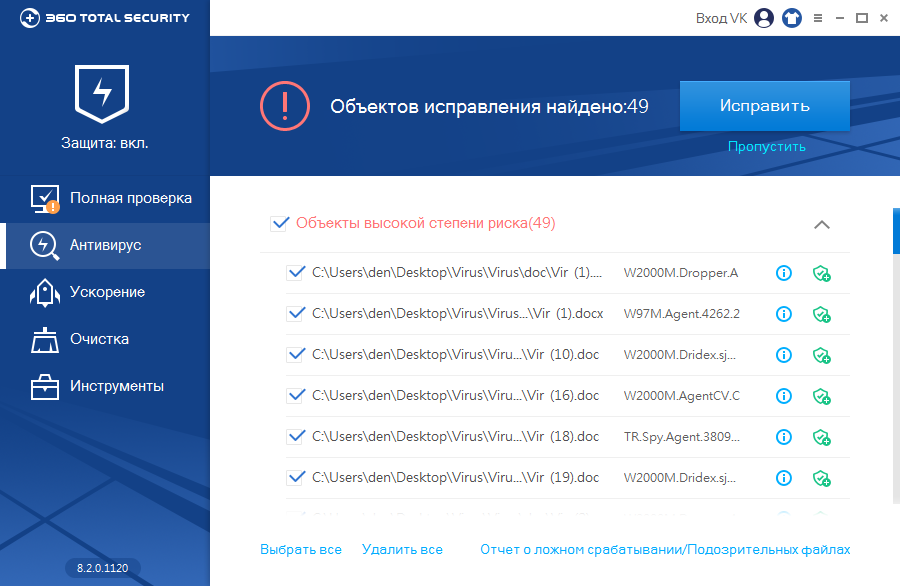
Fig. 23. No virus went unnoticed.
From this we can conclude that maximum protection is guaranteed when all available engines are turned on. Maybe this will have a little effect on performance, but security is not enough. What you need - either quickly and not very reliably - or a little slower, but it's safe to decide only you.
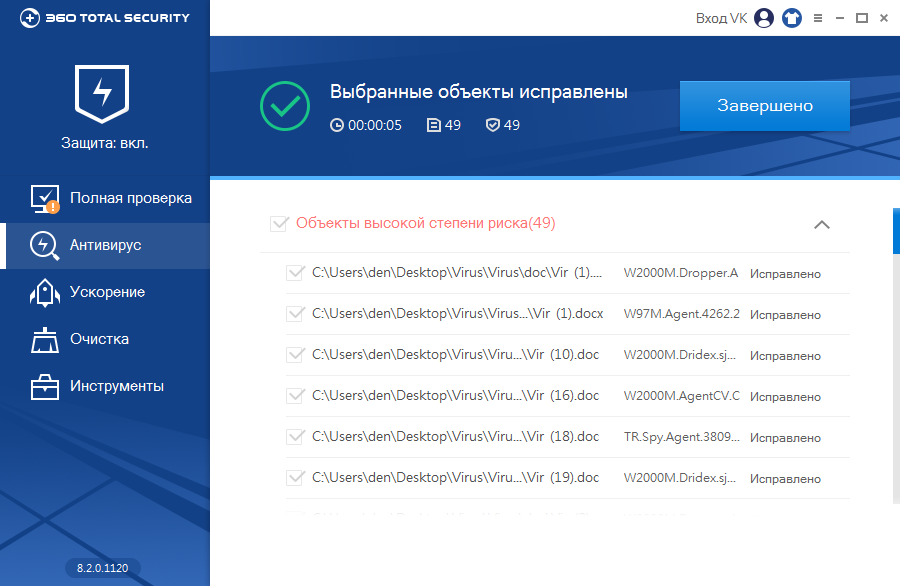
Fig. 24. “Balance” was successfully liquidated.
At the end of this review we will look at some useful program settings. Among the basic settings of the program, the user can turn on / off active protection at system startup, turn on / off self-defense, and turn on / off automatic updating (Fig. 25). For security reasons, all these options are best left on. The only parameter that can be disabled if you get tired of it is the display of the system load time after it is restarted.
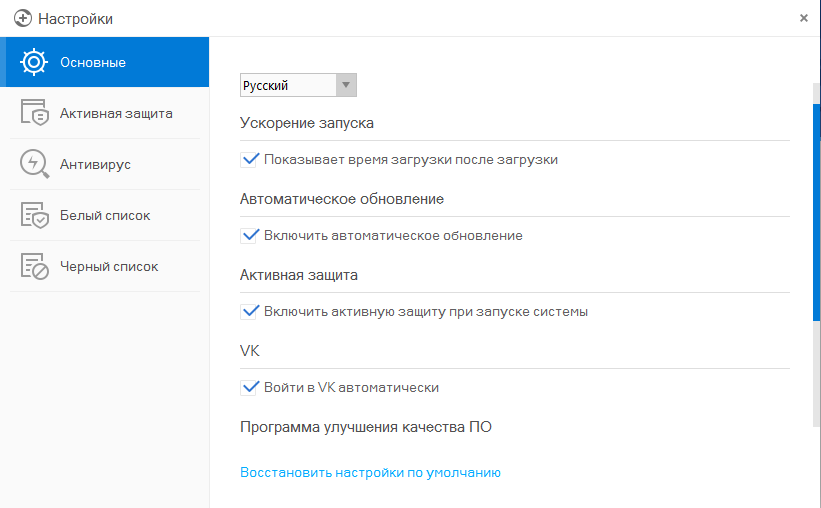
Fig. 25. Basic program settings
Themselves active protection settings are stored in the same section. For the sake of increased productivity, by default, only executable files and documents are checked, not all files in a row. Therefore, if you copy an archive with viruses into the system (even without a password), the antivirus will not react to it at all. As it turned out in the Anti-Virus section (Fig. 27), by default the program does not respond to compressed files at all. If you want archives to be scanned too, enable the Scan compressed files option during a full disk scan .
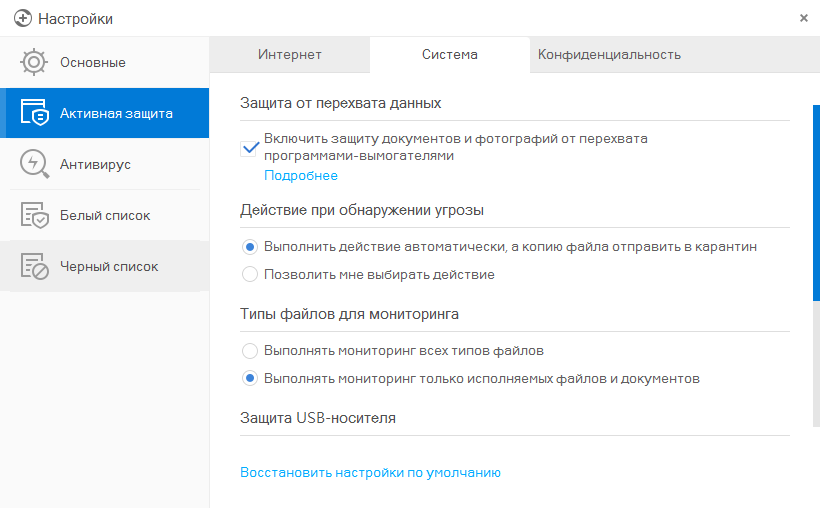
Fig. 26. By default, only documents and executable files are scanned.
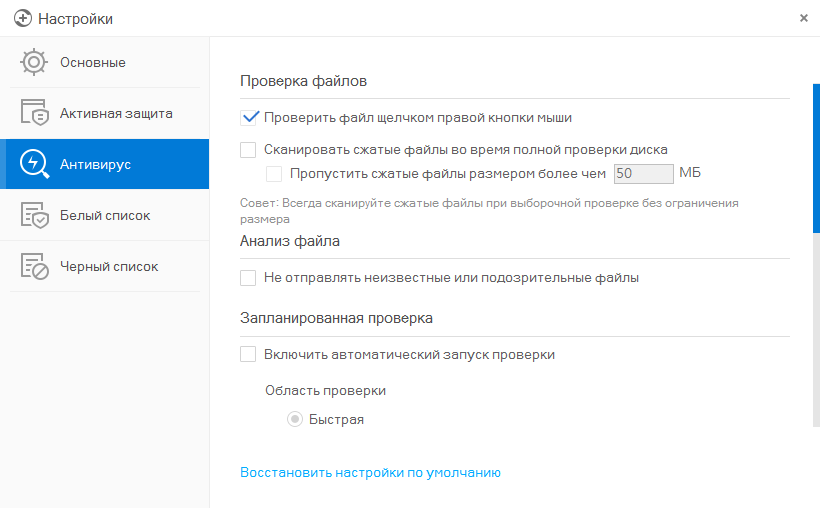
Fig. 27. Antivirus settings
On the Privacy tab, you can select the webcam protection mode - in strict mode, the antivirus will inform you about every attempt to access it (Fig. 28).
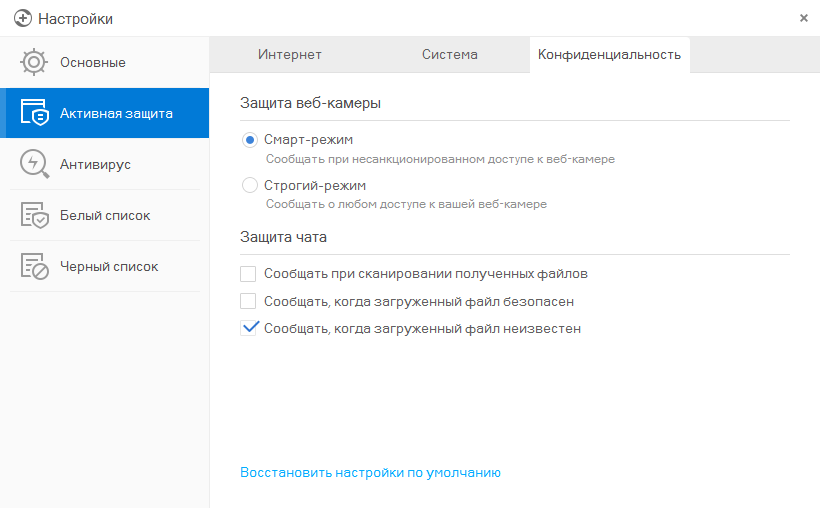
Fig. 28. Webcam Access Control
360 Total Security is a good one :), and most importantly a completely free antivirus, providing many additional useful tools. Maximum protection is provided by connecting additional Avira and Bitdefender anti-virus engines.
Thank you for your attention, I am interested in your opinion in the comments.

Difference between 360 Total Security and 360 Total Security Essential
Our site presents two software products - 360 Total Security and 360 Total Security Essential. The difference between them lies in the set of auxiliary modules. So, 360 Total Security Essential lacks an optimization module, temporary files cleaning, Wi-Fi security checks, and a Patch Up module.
The remaining functions of these antiviruses are the same, namely, the composition of both software products includes several anti-virus engines - 360 Cloud Scanner (360 Cloud), Avira AntiVir, Bitdefender AntiVir, 360 QVMII AI, sandbox, safe shopping module, anti-malware module (malware), webcam protection and keyloggers protection, system protection module. The last module includes checking USB storage devices during connection, firewall, behavioral blocking, registry protection, file scanning during opening and saving, and some other types of runtime protection.
')
Comparison with competitors
Let's see what 360 Total Security looks like against competitors. Since the product is free, competitors will also be free. However, there are a lot of antiviruses, and it would be difficult to compare the product under consideration with all existing antiviruses, so Avira Free Antivirus and Avast Free Antivirus were chosen as competitors for 360 Total Security.
The choice of competitors is due to several factors. Firstly, Avira Free Antivirus is considered the best free antivirus in 2015, in any case, it is said on their website, where the corresponding infographics are given. Secondly, 360 Total Security uses the Avira Antivir engine (although, in fact, it is only one of the engines, and only three different anti-virus engines are supported that can work together), so it was interesting to compare 360 Total Security with this antivirus. As for Avast, it showed very good performance (which is important for the antivirus - it should provide a good level of protection, but not consume a lot of system resources), which was shown in one of the reviews in “Hacker”. The table below allows you to evaluate the functions of the compared antiviruses. The table does not display the main functionality (monitor + scanner) - it is clear that any modern antivirus will have it, with the exception of the very trimmed scanner products like Dr. CureIt Web. The main functions also include protection against malware - malware. The fact is that some antivirus vendors allocate protection against malware as a separate function (for example, 360 Total Security), others consider it part of a scanner (Avira and Avast), others don’t even mention it, but this does not mean that antivirus cannot deal with this kind of software.
Comparison of the functionality of some free antiviruses
| Function | 360 Total Security | Avira Free Antivirus | Avast Free AntiVirus |
| Cloud protection | + | + | - |
| System fix | + | - | - |
| Sandbox | + | + | - |
| Secure online shopping | + | - | - |
| Webcam Protection | + | - | - |
| Protection against keyloggers | + | + (**) | + (**) |
| Password Manager | - | - | + |
| Removable Media Protection | + | + | + |
| Firewall | + | - | - |
| Registry Protection | + | - | - |
| Behavioral blocking | + | - | - |
| Vulnerability fix | + | - | - |
| Wi-Fi security check | + | - | - |
| Cleaning up temporary files | + | - | - |
| System optimization | + | - | - |
| Browser Protection | + | + (*) | + |
| Lock Browser Tracking | - | + (*) | |
| Secure browsing | - | + (*) | - |
| Price comparison | - | + (*) | - |
(**) This function is not separated, but all modern antiviruses detect keyloggers as malware.
Let's see what happens. The first thing that catches the eye is the fact that modern antiviruses are equipped with functionality that is in no way connected with the antivirus scan and system protection itself. So, Avira has a price comparison feature that allows you to save money when shopping online. 360 Total Security Antivirus is equipped with a powerful set of functions for optimizing and cleaning the system. And Avast has a built-in password manager.
The most "empty" option - Avast Free Antivirus. Only the antivirus itself (scanner and monitor), the browser protection feature and the password manager are included in its “bundle”. Yes, there is the Avast Internet Security product. There is also phishing protection, firewall, spam protection, but only a 30-day version is available for free, and a license for one year will cost 900 rubles for 1 PC or 2350 rubles for 3 years. The same can be said about Avira - if you need additional features, then you need to buy either Antivirus Pro (23.95 euros) or Internet Security Suite (30.95 euros). The most complete version is Internet Security Suite, it combines all the functions of Antivirus Pro plus functions for optimizing the system and encrypting files. Separately, the "additive" will cost 16.95 euros (product System Speedup). Note that 360 Total Security has all these features available for free.
So, 360 Total Security is completely free of charge, offering cloud protection, a firewall, fixing vulnerabilities (patch-up), system optimization and system cleaning, as well as a number of minor pleasant “lotions”.
Installation process overview
The installation process is so simple that any housewife can handle it. You need to download and run the installer (which, by the way, takes only 29.4 MB - this is a complete set for standalone installation), then you can either immediately click the Install button , or click the Settings button to select the folder to install the antivirus. No other settings (except for the choice of language) is offered.

Fig. 1. Installer 360 Total Security
The anti-virus includes several anti-virus engines, as noted earlier:
- Avira engine is a powerful engine developed by a German company. Off by default.
- Bitdefender engine is another supported engine developed by Romanian programmers. Disabled by default.
- The 360 Cloud Cloud Scanner is a private cloud anti-virus engine using information on checksums of files. Always on, not separately disabled.
- QVM AI is a proactive defense system using cloud technologies. Allows you to protect your system from threats unknown to the anti-virus. Always on and not individually disabled.
Individual engines can be turned on and off in the program settings, but first you need to download and install these engines. Fortunately, this process is fully automated. The user only needs to go to the Anti-Virus section and click the button corresponding to the desired engine. Below is the process of downloading and installing the Avira AntiVir engine. You can disable a temporarily unnecessary engine either in the program settings, or using the slider, which appears when you hover the mouse pointer to the engine button.

Fig. 2. Installing the Avira AntiVir engine

Fig. 3. Slider on / off the anti-virus engine
In practice, it is very convenient. In one "vial" the user receives several antiviruses that can be turned on / off at any convenient time.
Full system scan
In fig. 4 shows the result of a full system scan. The program has found two problems - 4 threats related to the optimization of the system, and many temporary files (1.4 GB). Next, the user can click the Repair button to correct the threats, and then click the Recheck button to re-check. As you can see, the program interface is quite simple and informative.

Fig. 4. The result of a complete system check.
Full system scan includes the search for problems related to the optimization of the system, the search for "garbage", as well as the search for viruses and other malicious programs. The Wi-Fi security check module could not be verified, because for some reason the router model I use is not supported by the program.
Antivirus check
If desired, you can conduct all these checks separately. For example, in the Anti-Virus section (see fig. 2 and 3), you can perform quick, complete and selective (for example, scan files on a flash drive) system checks. Further in this review anti-virus protection will be shown in action. As they say, "do not switch."
System optimization and cleaning
The system optimization module found in test freshly installed Windows 10 as many as 22 points for optimization (Fig. 5). The module offers to disable some scheduled tasks (as a rule, unnecessary ones like software quality improvement programs), some unnecessary services (who needs font font buffering?), As well as optimize the network connection. To fix all the problems found, click the Optimize button.

Fig. 5. Optimization module

Fig. 6. System optimization done
The system cleaning module allows you to remove various garbage like temporary files, browser cache files, system garbage, etc. (Fig. 7).

Fig. 7. System cleaning module
When the cleaning is completed, the program will offer to free up additional disk space using the System Backup Cleaner (Fig. 8). If the automatic update of your system is not turned off, this tool can be quite useful, since it allows you to delete unused backup files of system updates, which take up quite a lot of space (Fig. 9).

Fig. 8. Cleaning complete

Fig. 9. Cleaning up system backups
Additional tools
The composition of 360 Total Security includes the following additional tools:
- 360 Connect - if you need to set up your grandmother’s computer remotely, this tool will help you. It is not considered in detail in this review, but everyone can get acquainted with the press kit .
- Instant installation - allows you to install various popular programs with one click (ICQ, Skype, etc.)
- Browser protection - allows you to protect your browser from unauthorized changes to the search engine and / or start page (Fig. 12). Unlike competitors, the functions of safe viewing and blocking "shadowing" for the user are not available.
- Firewall - the regular Windows firewall is pretty good and it will satisfy the needs of most users. If it turns out to be small, then 360 Total Security offers to install (completely free of charge) the GlassWire Firewall. Actually, after running the Firewall tool, you will see a window with the Install button. After installing the firewall, this button will launch it.
- Sandbox - allows you to run dangerous programs, all changes to the system configuration made in the sandbox will not affect the real system. A very useful feature if you are not sure about the application.
- Vulnerabilities is a useful system vulnerability scanner that allows you to check for security updates and various patches. It is also possible to install / remove this or that security update (patch).
- Cleaning up system backups - this tool has already been demonstrated earlier.
- Compress Disk - allows you to free up disk space by compressing system files. On the test machine, the tool offered to release by compression 4.7 GB. Remember that the compression of system files will certainly lead to a decrease in performance, so resorting to this measure is necessary only as a last resort (when free space is more important than performance).

Fig. 10. Additional tools

Fig. 11. Instant installation of programs

Fig. 12. Browser protection

Fig. 13. Sandbox

Fig. 14. Security Updates

Fig. 15. Compressing system files. You can free 4.7 GB.
About antivirus performance
Three processes hang in the memory, which very modestly consume both processor time and RAM. Screenshot 16 was made on a test machine, and on a working laptop on which these lines are written, Firefox takes up 530 MB of RAM, so against its background, the total memory consumption of up to 50 MB seems like a drop in the ocean.

Fig. 16. System resources
The test machine is still pretty weak - 3 GB of RAM and dual-core Intel 1000M mobile about 1.8 GHz. The operating system is 64-bit Windows 10, as it is planned to upgrade the memory to 8 GB. But even in such a configuration, the presence of an antivirus does not affect system performance. Special brakes are not felt, and if they are, they are invisible to the user.
Noticeable braking is possible only when the antivirus is running in scanner mode and a computer scan is running. But it is unlikely that a user suspecting that his PC is infected (and then why start a full scan?) Will calmly continue working at this point - he will wait for the system to check, and for the time of the check itself will close all applications. Even if such a user wants to work, then after starting the scan, you need to wait a bit - the consumption of system resources is significantly reduced (Fig. 18).

Fig. 17. Consumption of system resources when scanning a PC at the time of launching the scan

Fig. 18. Verification is in full swing. Only 35.1% of CPU time is used, the hard disk is also not overloaded
In some reviews, the 360 Total Security product is being criticized for a rather resource-demanding anti-virus update mechanism. But on the test machine was not seen anything like that. In fig. 19 shows that the process of updating the antivirus took only 5.5% of the CPU time.

Fig. 19. Antivirus update process
Real test
The time has come for the most interesting part of this review - the real test. I have a good selection of infected files (both exe and Word documents). Each file from this collection is infected, there are 142 files in total. Let's see how many viruses 360 Total Security will find. All viruses are detected by other antiviruses like Dr. Web, Kaspersky, etc. For greater fairness, additional engines will be disabled, only standard protections will be used.
In order not to infect the system, everything was checked like this: the archive was copied (with a password), then it was unpacked. Immediately after unpacking, the antivirus began to respond. The result of his work is shown in Fig. 20 - 92 infected files were found and eliminated. Next, the antivirus recommended running a quick scan, since many malicious programs were found at once (Fig. 21).

Fig. 20. The results of the anti-virus

Fig. 21. Run a quick check?
Let's give the antivirus a second chance. Let's try to check the folder into which the infected files were unpacked by the scanner. Antivirus found only one more file (a total of 93 files out of 142 were recognized as dangerous).

Fig. 22. Found another virus
Now we will turn on both additional engines - Avira and Bitdefender and try again to scan the folder with the viruses. Logically, there are still 49 infected files in it. Voila Antivirus found the remaining 49 viruses (Fig. 23).

Fig. 23. No virus went unnoticed.
From this we can conclude that maximum protection is guaranteed when all available engines are turned on. Maybe this will have a little effect on performance, but security is not enough. What you need - either quickly and not very reliably - or a little slower, but it's safe to decide only you.

Fig. 24. “Balance” was successfully liquidated.
Program Settings Overview
At the end of this review we will look at some useful program settings. Among the basic settings of the program, the user can turn on / off active protection at system startup, turn on / off self-defense, and turn on / off automatic updating (Fig. 25). For security reasons, all these options are best left on. The only parameter that can be disabled if you get tired of it is the display of the system load time after it is restarted.

Fig. 25. Basic program settings
Themselves active protection settings are stored in the same section. For the sake of increased productivity, by default, only executable files and documents are checked, not all files in a row. Therefore, if you copy an archive with viruses into the system (even without a password), the antivirus will not react to it at all. As it turned out in the Anti-Virus section (Fig. 27), by default the program does not respond to compressed files at all. If you want archives to be scanned too, enable the Scan compressed files option during a full disk scan .

Fig. 26. By default, only documents and executable files are scanned.

Fig. 27. Antivirus settings
On the Privacy tab, you can select the webcam protection mode - in strict mode, the antivirus will inform you about every attempt to access it (Fig. 28).

Fig. 28. Webcam Access Control
findings
360 Total Security is a good one :), and most importantly a completely free antivirus, providing many additional useful tools. Maximum protection is provided by connecting additional Avira and Bitdefender anti-virus engines.
Thank you for your attention, I am interested in your opinion in the comments.
Source: https://habr.com/ru/post/280003/
All Articles